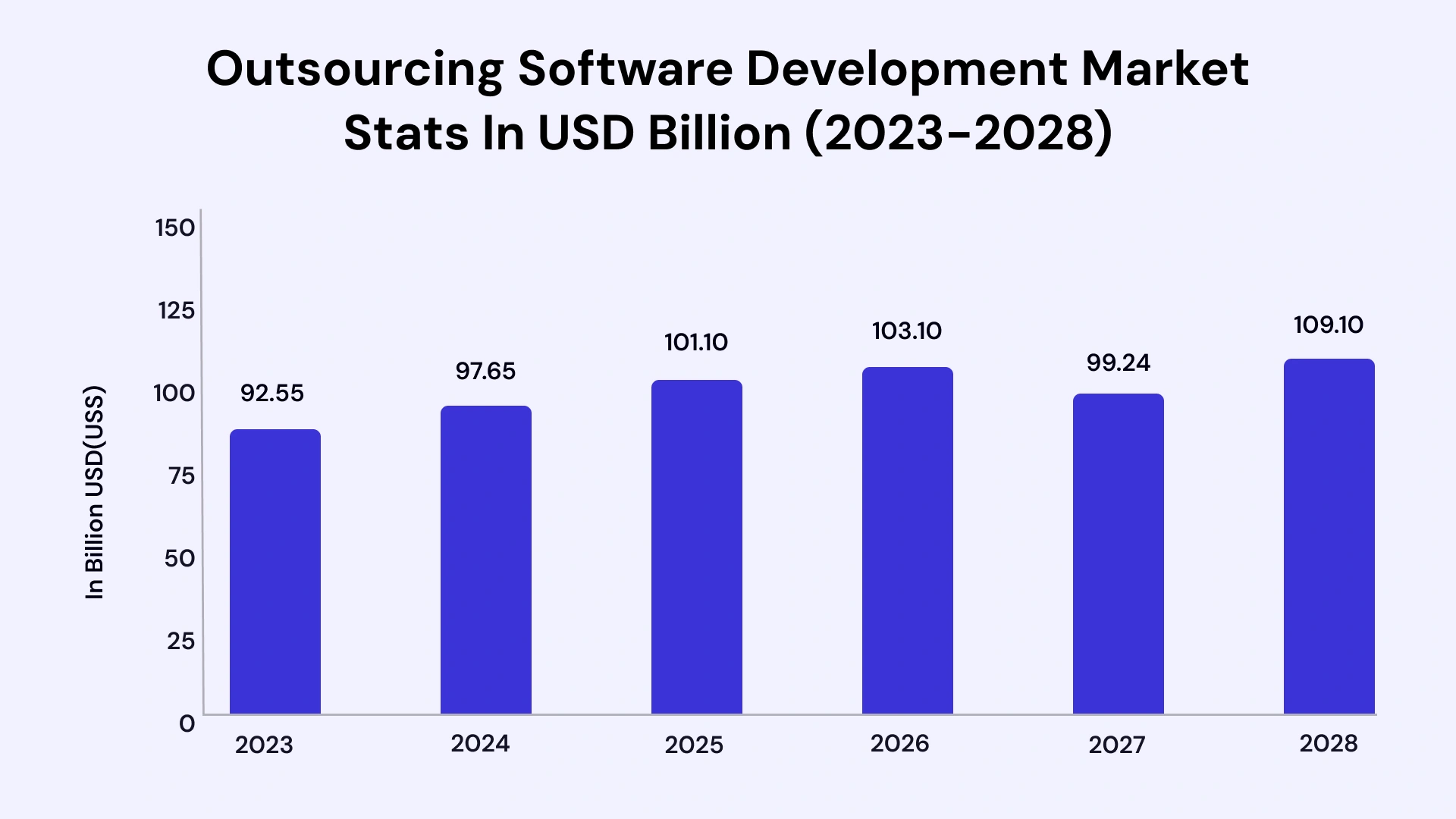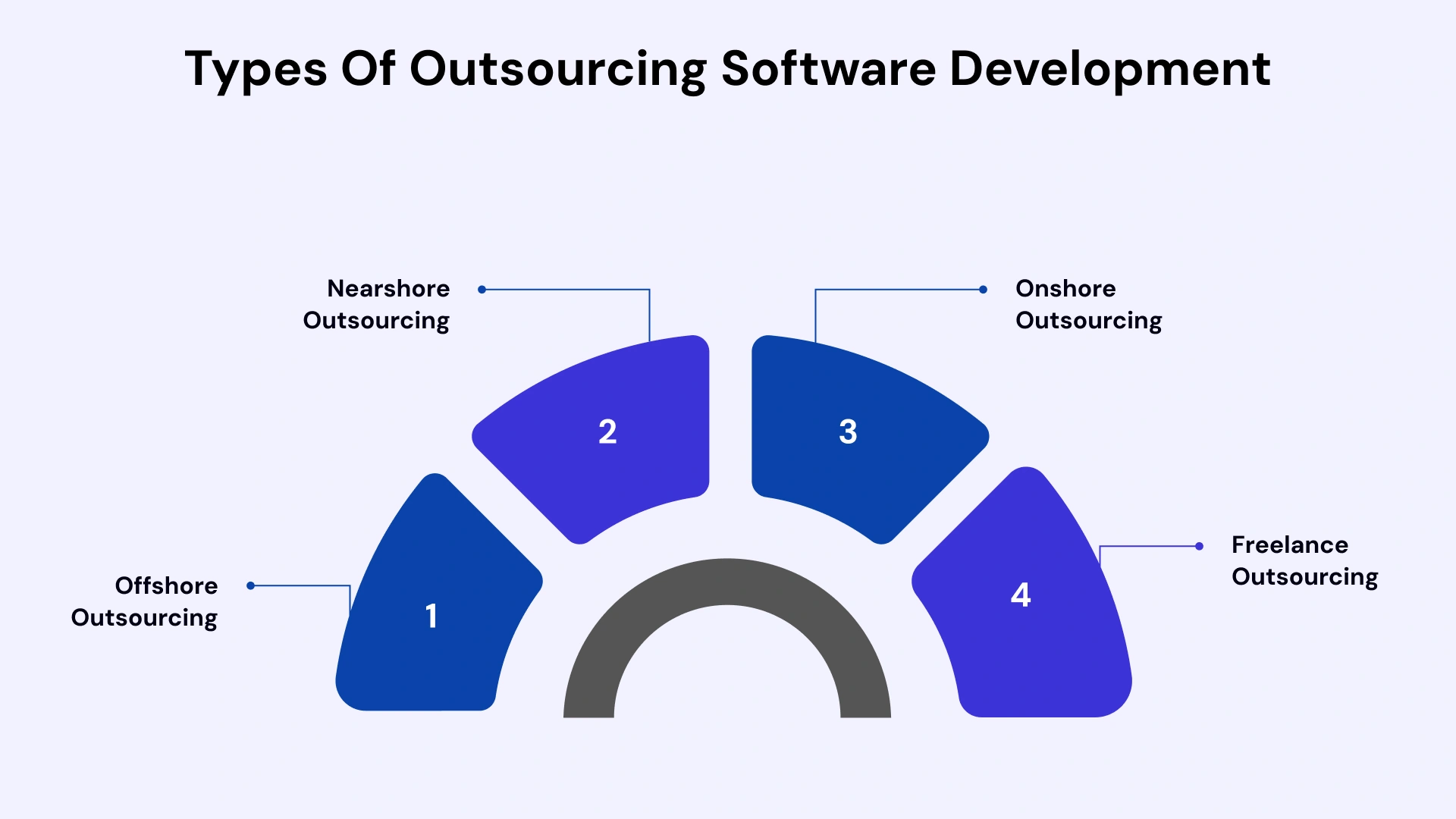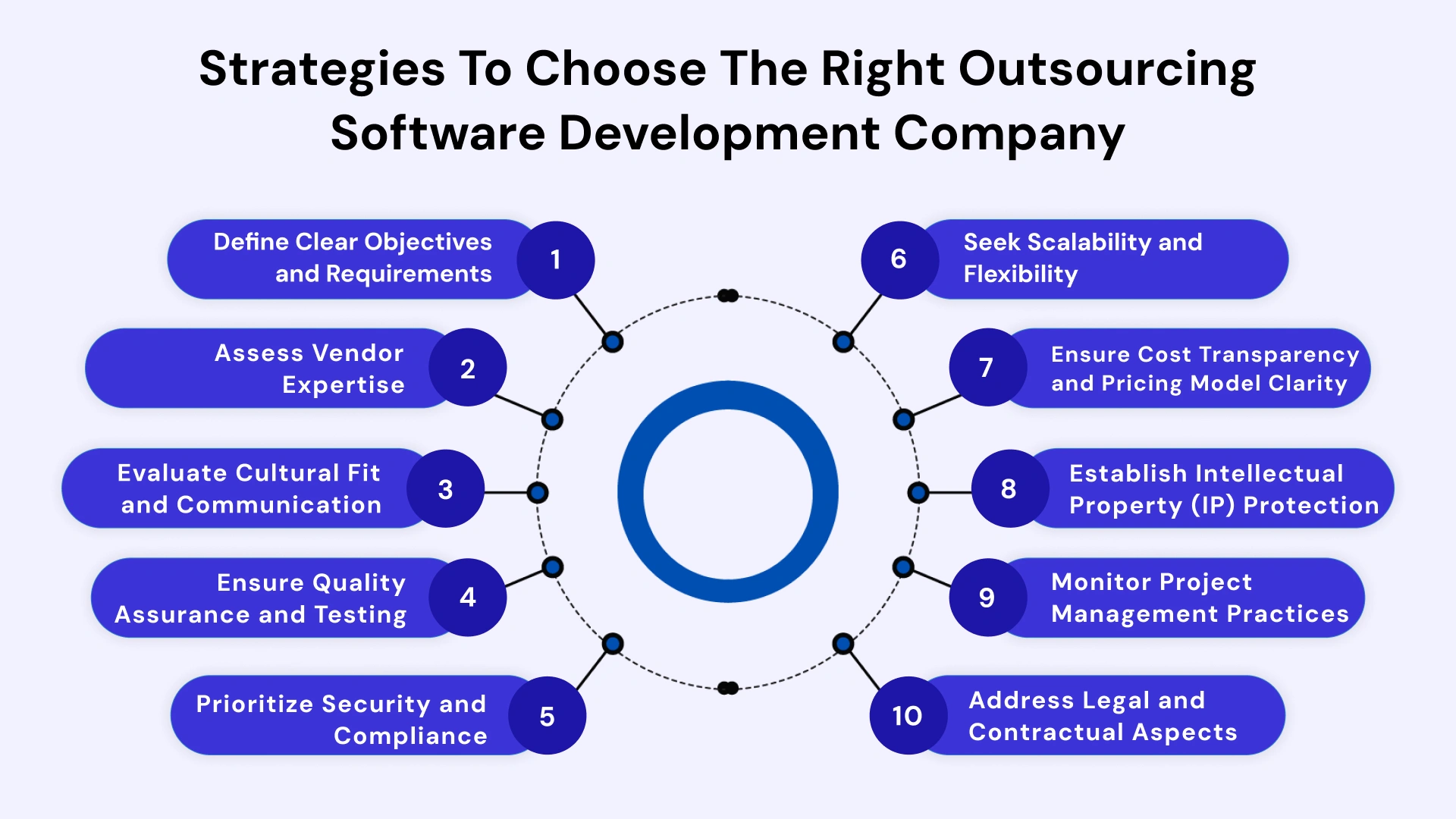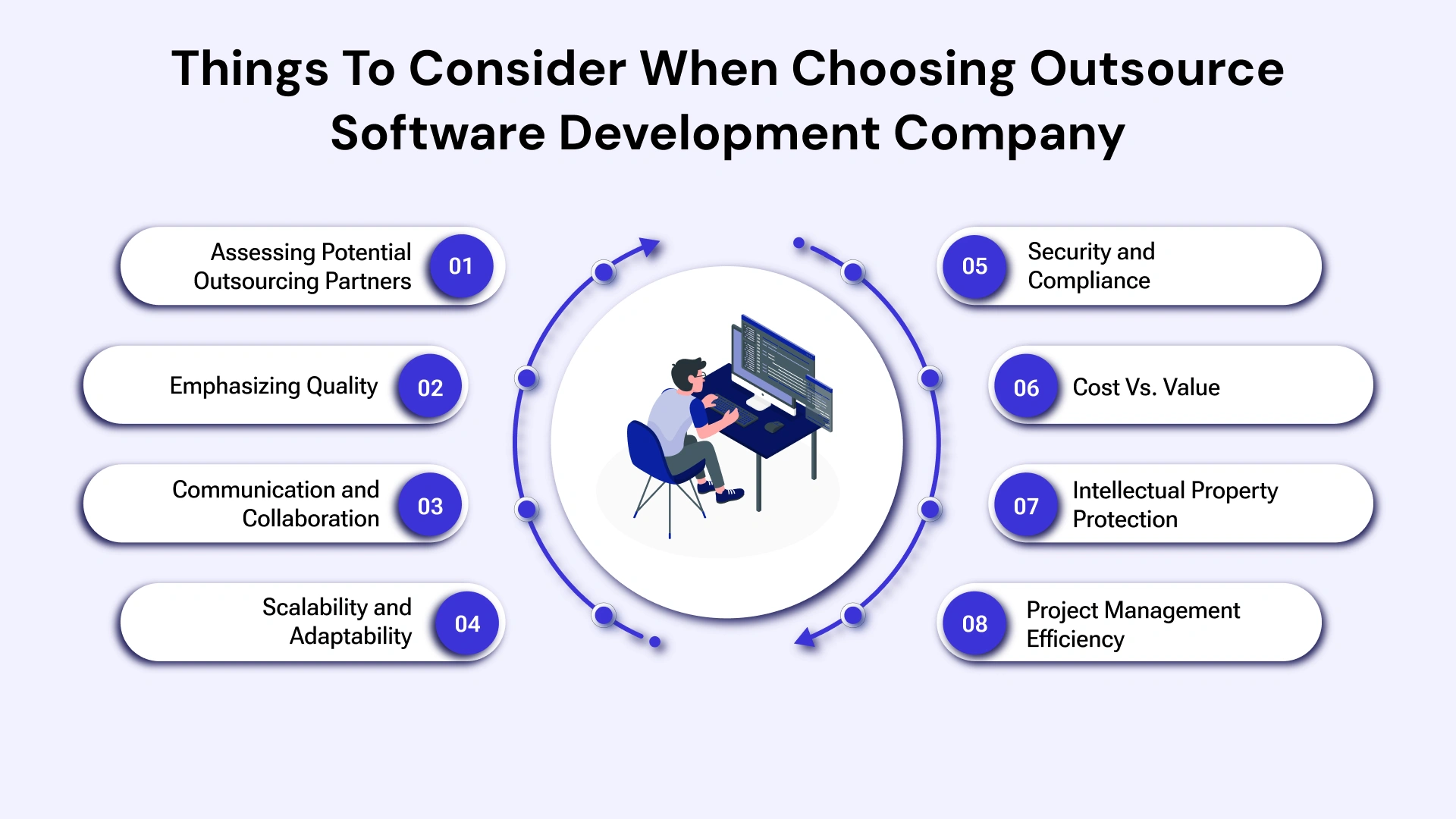In today's tech-driven world, an increasingly popular strategy is the outsourcing of software development. Outsourcing provides several benefits to companies of all sizes, from small and medium to large. Outsourcing benefits are cost & time savings, flexibility, scalability, improved efficiency and productivity, global expansion
and market penetration, and risk management.

The success of outsourcing depends only on selecting the right outsource software development company. In this blog, we will explore key strategies for a seamless and successful outsourcing journey.
What is Outsourcing Software Development?
Outsourcing software development refers to the practice of hiring external third-party companies to handle the design, development, testing, and maintenance of software applications or systems.
Instead of having an in-house team, companies opt to delegate these tasks to outsource software development companies often located in different geographical regions, to take advantage of cost savings, access to specialized skills, and scalability.
Key Facts of Outsourcing Software Development
- 66% of businesses in the United States outsource at least one department of their project.
- 24% of small businesses outsource their requirements to enhance efficiency.
- 70% of IT companies find outsourcing cost-effective to minimize the hiring in-house costs.
- 78% of worldwide companies that outsource work have a positive attitude towards their outsourcing partners.
- 90% of businesses can take advantage of more outsourcing opportunities thanks to significant trends of IT outsourcing like cloud and AI, ML.
Types of Outsourcing Software Development

- Offshore outsourcing: Hire developers located in a different country, typically selected for lower labor costs.
- Nearshore outsourcing: Engaging a software development team located in a neighboring country or within the same region, offering advantages such as overlapping time zones and cultural similarities.
- Onshore outsourcing: Partnering with software development companies or freelancers within the same country, often for reasons like language proficiency, legal compliance, or ease of communication. Onshore vs. offshore outsourcing, companies always prefer to choose the right one.
- Freelance outsourcing: Hiring individual software developers or small teams on a project-by-project basis, offering flexibility and cost-effectiveness.
Outsourcing Software Development Models
Outsourcing software development models are categorized into four parts: Fixed price, time and materials, dedicated team and IT staff augmentation.
| Parameters | Fixed Price | Time and Materials | Dedicated Team | Staff Augmentation |
| Project Size | Small | Small, Medium | Large | Large |
| Business Needs | Fixed and pre-defined | Dynamic and flexible | Adapt as innovation progresses | Adapt as innovation progresses |
| Scope and Resource | Clearly defined | Rough estimation | Rough estimation | Rough estimation |
| Client Control | Zero to little | Substantial | Full | Full |
Strategies to Choose the Right Outsourcing Software Development Company

Define Clear Objectives and Requirements
Before embarking on outsourcing, it's imperative to grasp your project's objectives and requirements thoroughly. Clearly articulate your aims, functionality needs, and any specific technical or industry-related factors. This forms the groundwork for selecting a software development partner with the appropriate expertise and capabilities.
Assess Vendor Expertise
Not all software development firms are equal. Evaluate the expertise and track record of potential outsourcing partners. Seek evidence of successful projects within your industry and relevant technologies. Ask for case studies, client testimonials, and references to deliver high-quality solutions.
Evaluate Cultural Fit and Communication
Effective communication is pivotal in outsourcing relationships. Assess the cultural compatibility between your organization and the outsourcing partner. Consider factors like time zone differences, language proficiency, and cultural nuances that may impact collaboration. Choose a vendor with proactive communication, proficient English skills, and a compatible work culture.
Ensure Quality Assurance and Testing
Confirm that the outsourcing partner adheres to rigorous quality assurance and testing protocols. Strong testing practices are essential for delivering a reliable and bug-free software product. Inquire about testing methodologies, tools, and coverage to ensure the quality of the final deliverable.
Less Effort, efficient workflow, lower costs are a few benefits of outsourcing software testing services.
Prioritize Security and Compliance
Safeguarding sensitive data and complying with industry regulations are critical outsourcing considerations. Evaluate the vendor's security measures, data protection policies, and adherence to standards like GDPR or HIPAA. A reputable outsourcing partner prioritizes security and compliance throughout the development lifecycle.
Seek Scalability and Flexibility
Select a software development partner capable of scaling up to meet your business needs. Assess their ability to accommodate changes in project scope, increased workloads, and evolving requirements. Flexibility is crucial for adapting to unforeseen challenges or modifications and ensuring project success.
Ensure Cost Transparency and Pricing Model Clarity
While cost savings are a primary motivation for outsourcing, transparency in pricing models is essential. Understand how the outsourcing partner structures their charges and ensure alignment with your budget and financial objectives. Consider factors like hourly rates, project-based pricing, and potential hidden costs.
Establish Intellectual Property (IP) Protection
Clearly define ownership terms for intellectual property upfront. Establish a comprehensive agreement regarding ownership of code, data, and project-related assets. A well-defined IP protection strategy safeguards your investment and minimizes future legal complications.
Monitor Project Management Practices
Effective project management plays a vital role in the success of outsourcing. Evaluate the outsourcing partner's project management methodologies, tools, and communication practices. Regular updates and a collaborative approach contribute to a transparent and well-coordinated development process.
Address Legal and Contractual Aspects
Before finalizing any outsourcing agreement, thoroughly review and negotiate legal and contractual terms. Ensure that the contract covers essential details such as deliverables, timelines, payment terms, confidentiality clauses, and dispute resolution mechanisms. Seek legal counsel to mitigate potential risks.
If you are planning to outsource iOS app development company, ensure to select the trustworthy once by following above mentioned strategies.
Things to Consider When Choosing an Outsource Software Development Company

Let's explore the key considerations that should guide your decision-making process when selecting a software development outsourcing partner.
Assessing Potential Outsourcing Partners
When evaluating potential outsourcing collaborators, it's essential to gauge their expertise and experience in your industry and the pertinent technologies. Seek partners with a track record of successfully delivering projects akin to yours. Ensure they possess the requisite skills and experience to address the complexity of your requirements.
Emphasizing Quality
Quality is paramount in software development. Scrutinize the outsourcing partner's commitment to quality by examining their portfolio, client testimonials, and case studies. Look for certifications, industry accolades, and adherence to best practices. A partner focused on quality contributes to the long-term viability of your software solution.
Communication and Collaboration
Effective communication is fundamental in outsourcing relationships. Evaluate the partner's communication channels, responsiveness, and cultural alignment. Account for time zone differences to facilitate seamless communication and transparent project management. A dependable partner fosters open and clear communication throughout the project lifecycle.
Scalability and Adaptability
Select an outsourcing partner equipped to scale alongside your business. Assess their capacity to expand the team, embrace new technologies, and accommodate evolving project requirements. Flexibility enables you to navigate challenges and capitalize on opportunities as they arise.
Security and Compliance
Security is paramount in software development, particularly when outsourcing. Ensure your prospective partner adheres to robust security practices, complies with industry standards, and respects data protection regulations. Conduct a thorough security evaluation encompassing infrastructure, data protection, and secure coding practices.
Cost Vs. Value
While cost is a significant consideration, it should not overshadow overall value. Evaluate the partner's value proposition based on quality, timeliness, and long-term benefits. The lowest-cost option may not necessarily offer the best value in the long run.
Intellectual Property Protection
Clarify intellectual property rights and protection from the outset. Ensure the outsourcing partner has clear policies regarding code ownership, confidentiality, and non-disclosure agreements to safeguard your intellectual assets.
Project Management Efficiency
Effective project management is the most important thing to consider for successful software development. Assess the partner's project management methodologies, development processes, and tools. Transparency, regular reporting, and collaborative problem-solving signal a well-organized and efficient partner.
Outsource Software Development with VLink!
VLink is a trustworthy outsourcing software development company with business benefits across all offshore locations. We offer businesses a broad scope of Software outsourcing services, including web development, software testing and QA services, mobile development, outsourced software development, and other services.
We help businesses stay ahead in the market by accessing a dedicated development team of experienced IT experts. They are experts in building and deploying robust custom software solutions for industry.
Here are the benefits you will get with us:
- Access to the Top 1% of Talent
- Streamline Communications
- Skip Recruitment Delays
- A Large Network of Talented Pool
- Faster Hiring
To employ our outsourcing software development services, contact us now!









 Shivisha Patel
Shivisha Patel

















